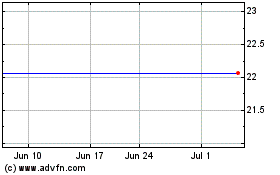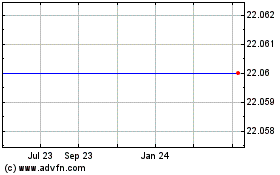Mall Owners Go on Defensive to Rescue Aéropostale
September 27 2016 - 5:59AM
Dow Jones News
By Esther Fung
A move by a pair of mall owners to rescue distressed retailer
Aéropostale Inc. shows how some landlords are getting more
aggressive as they seek to stem a rising tide of vacancies and
store closings.
Simon Property Group and General Growth Properties Inc. were
part of a consortium that last week won an auction to purchase
teen-apparel retailer Aéropostale, an unusual move in which
shopping-center landlords stepped in to rescue a tenant to preserve
the tenant's business.
The push to take over the struggling retailer comes at a time
when changing shopping habits and the growth of e-commerce are
eating into traditional retailers' revenue and in some cases
forcing store closures. That, in turn, is weighing on mall
operators, forcing some to reconfigure their properties and add
other attractions to bring in shoppers.
Simon and General Growth saw value in keeping afloat
Aéropostale, which had filed for chapter 11 bankruptcy protection
in May and later faced the threat of liquidation. Aéropostale
stores potentially generate more than $1 billion in global retail
sales, of which more than $800 million is from the U.S., said
General Growth Chief Executive Sandeep Mathrani in a news release.
Simon counts 160 Aéropostale stores and General Growth has 77 in
their respective tenant portfolios.
General Growth and Simon declined to comment about their
turnaround strategy for Aéropostale.
Faced with rising vacancies as retailers close their stores amid
the increasing popularity of online shopping, landlords are trying
to find ways to avoid being left with crumbs, said Tom Mullaney,
JLL's managing director of restructuring services.
But by moving into retailing, Simon and General Growth are
stepping out of their comfort zones.
"It's going to be a very interesting experiment to see if they
can operate the retailer successfully," Mr. Mullaney said.
When retailers file for bankruptcy and are liquidated, landlords
are vulnerable to vacancies and undesirable situations where the
tenant might stay open for a prolonged period to sell down
inventory.
Landlords don't like to see going-out-of-business-sale signs on
the windows and fear being stuck with blighted space, said Thomas
Dobrowski, senior managing director of capital markets with
real-estate-services firm Newmark Grubb Knight Frank. That
restricts the landlord's ability to find higher-caliber,
creditworthy tenants or market the space at higher rents.
"Liquidation and bankruptcies tend to be messy and landlords
would rather avoid that at nearly all cost," said D.J. Busch, an
analyst at Green Street Advisers. "That said, we have not seen
landlords step in and 'save' a distressed retailer as it seems to
be the case with Aéropostale. This seems unprecedented."
Shopping-center landlords have bought out distressed retailers
in recent years, but primarily for the real estate they owned
rather than to preserve the tenant's business.
In the early 2000s, retail property landlord Kimco Realty Corp.,
along with other lenders, extended financing to discount retail
chain Ames Department Stores Inc. with its properties as
collateral. Ames eventually folded. In 1995, Steven Roth, CEO of
Vornado Realty Trust, bought a controlling interest in ailing
discount department store Alexander's Inc. Alexander was then
converted to a real-estate investment trust.
In contrast, the deal by Simon and General Growth seems to be
more defensive, with the pair moving in only when it became
apparent no other party was going to put in a bid to keep
Aéropostale from going out of business.
If the retailer had gone through a liquidation, the landlords
would have been left with more than 200 vacant stores, and might
only get one-year's rent or 15% of the remaining lease payment,
whichever is greater. But rental leases are typically an unsecured
claim and landlords are parked at the bottom of the distribution
totem pole behind secured creditors.
Simon and General Growth led a consortium that included
Authentic Brands Group, Hilco Merchant Resources and Gordon
Brothers Retail Partners to invest $243.3 million for the
acquisition, which they say saved thousands of jobs and will keep
the brand available in more than 400 stores in the U.S. and
Canada.
Leasing agents have said that some mall landlords are agreeable
to lower rents for Aéropostale following the bailout. Court
documents showed Aéropostale had been operating 623 retail
stores.
--Lillian Rizzo contributed to this article.
Write to Esther Fung at esther.fung@wsj.com
(END) Dow Jones Newswires
September 27, 2016 05:44 ET (09:44 GMT)
Copyright (c) 2016 Dow Jones & Company, Inc.
GGP Inc. (NYSE:GGP)
Historical Stock Chart
From Mar 2024 to Apr 2024

GGP Inc. (NYSE:GGP)
Historical Stock Chart
From Apr 2023 to Apr 2024
